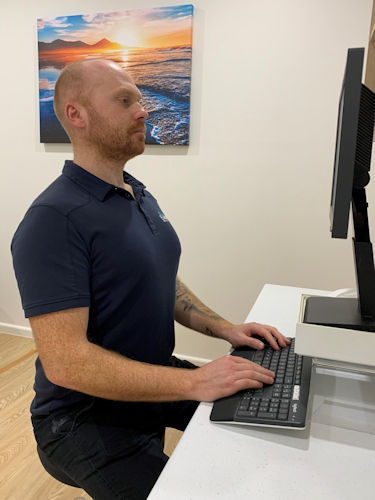If you are an office worker, it is likely you are guilty of prolonged sitting. Now it might sound harmless, but prolonged sitting is responsible for causing long-term physical and emotional strain that can lead to serious health concerns.
The physical toll of prolonged sitting is one of the largest challenges faced by patients that we see day to day. Prolonged sitting can result in a variety of health issues including poor posture, weight gain, and poor circulation. In significant cases of poor circulation, it is possible to develop varicose veins and even deep vein thrombosis (DVT) in severe circumstances. Additionally, prolonged sitting is also associated with an increased risk of type 2 diabetes as well as cardiovascular disease.
Sitting for long periods can also cause muscular stiffening, resulting in back and neck discomfort, headaches, and even poor digestion. Your muscles are made to move, so when they are in a static posture for an extended period of time, they can become exhausted, causing pain and discomfort.
Additionally, the emotional toll of prolonged sitting is often overlooked, but it can have a significant impact on your overall well-being. Extended sitting can be emotionally taxing, as it can cause feelings of weariness and impatience, making it harder to concentrate on work and possibly contributing to emotions of tension and fatigue. This often leads to a decrease in productivity and an increase in stress levels.
The Good News!
The good news is that there are some simple ways to modify your workstation and your day, to lessen the impact that prolonged sitting has on your body. Keep reading, as we share our Top Ten Tips to help!
1. Take Frequent Breaks
As we mentioned above, long sitting durations can have a harmful impact on our health in numerous ways. To counteract these issues, it is essential to take regular and frequent pauses during the day to stand, stretch, and move about. Set yourself an alarm for at least five minutes of physical activity, ideally each hour of your day. This could be as simple as stretching your neck and shoulders or getting up to go for a short walk around the office.
2. Use Correct Posture
Incorrect posture can result in several health issues, including back and neck discomfort, headaches, and even digestive issues. Keep your feet firm on the floor, your back straight, and your shoulders relaxed to preserve appropriate posture. Make sure that you have an ergonomic (comfortable throughout the whole day) chair with adequate lumbar support to maintain a neutral spine position where you don’t find that you are tempted to hunch forward or backwards to relieve discomfort.

3. Adjust Your Monitor Settings
Monitor location may have a significant influence on your posture and comfort. Ensure that the display is at eye level, approximately an arm’s length from your face, and leant back. This will avoid excessive tension on the neck and eyes.
Pro Tip: One of our favourite ways to remind ourselves to practice good posture is to envision a small piece of string being gently pulled upwards from the middle of your head. If you’re slouching this should help you immediately sit upright, drop your shoulders down and tuck in your chin!
4. Utilise a Mouse Pad that Provides Wrist Support
Using a mouse for lengthy periods of time can cause significant wrist and forearm strain. Try using a mouse pad with built-in wrist support to reduce the risk of these problems developing.
5. Maintain an Orderly Work Space
It may sound silly, but in a workplace study, 40% of workers admitted an untidy workspace makes them less productive! A messy work environment can be a significant distraction and even lead to emotions of stress and anxiety. Take a moment to organise your desk. This will help you boost and maintain your concentration and productivity throughout the day!
6. Stay Hydrated
Hydration is crucial for general health and well-being because it regulates body temperature, transports nutrients and oxygen to cells, and eliminates waste materials within the body. It is easy to forget to drink enough water when you’re busy at work and as we all know, not drinking water enough causes dehydration. Symptoms of dehydration include weariness, headaches, a decline in cognitive function and over longer periods of time dry skin.
Consuming at least eight glasses of water daily is a reasonable rule of thumb for maintaining hydration. It is essential to remember, however, that individual requirements may differ based on factors such as body size, activity level, and your environment.
There are a few things that may be done to make it easier to remain hydrated when sitting at a computer:
- Having a water bottle within easy reach will serve as a reminder to drink and make it more convenient to do so.
- Set reminders on your calendar or phone to drink water at regular times throughout the day.
- Monitor your urine colour: If your urine is clear or pale yellow, you are usually well-hydrated. If it is dark yellow or amber, take this as a warning to really take steps to increase your hydration levels
- Consuming water before and after meals is a great way to remember to incorporate keeping hydrated into your daily routine and will assist in maintaining appropriate hydration levels throughout the day!

7. Keep Nutritious Snacks On Hand
Skipping meals and snacking on unhealthy foods high in processed sugars like milk chocolate or lollies might result in weariness and irritation that occur in relation to fluctuating blood sugar levels. Maintain a supply of nutritious snacks, such as fruits, almonds, and yoghurt, to maintain your energy levels throughout the day.
8. Try a Standing Desk
As more and more research shows the dangers of extended sitting, standing workstations are becoming increasingly popular. Standing desks provide workers with better flexibility to meet their health needs whilst still getting the work done.
Whilst it isn’t always possible to use a standing desk, if you can permit standing while working, standing workstations or standing whilst working can help:
Improve Posture
By pushing you to utilise your core muscles and stand up straight, standing desks can aid in the promotion of healthy posture.
Improve Circulation
When seated, your blood flow might become limited, leading to circulation issues. Standing workstations can enhance circulation by promoting greater movement and weight shifts.
Increase Energy Levels
Prolonged sitting might leave you feeling lethargic and exhausted. Standing workstations can increase energy levels by promoting greater movement and physical activity.
9. Don’t Forget To Exercise
Regular exercise is vital for overall health and well-being, and individuals who spend most of their day sitting at a computer should be conscious of getting enough physical activity during their day and working week. Ideally, aim for at least five days per week of at least 30 minutes of moderate-intensity activity, such as brisk walking, jogging or cycling.

10. Get Enough Sleep
Getting adequate sleep is critical for optimal health. Aim for a minimum of seven hours of sleep every night and develop a consistent sleep pattern. The impact on your body will speak for itself.
Here are my top 3 tips to improve sleep quality:
Create a Consistent Sleep Routine
Our bodies thrive on routine and sticking to a consistent sleep schedule is one of the most effective ways to improve sleep quality. Aim to go to bed and wake up at the same time every day, even on weekends. This will help regulate your body’s internal clock and make it easier to fall asleep, and wake up feeling refreshed.
Create a Relaxing Before Bed Routine
Creating a relaxing bedtime routine can help signal to your body that it’s time to sleep. This can include activities such as taking a warm bath, practicing yoga or meditation, reading a book, or listening to calming music. Avoid stimulating activities such as watching TV or using electronic devices in the hour before bed, as the blue light emitted by these devices can interfere with your body’s production of melatonin – a crucial hormone for sleep!
Try Acupuncture
Did you know Acupuncture can help improve sleep quality by promoting relaxation and reducing stress and anxiety? Another great benefit of Acupuncture is that it helps regulate the body’s production of melatonin.

To Sum It Up…
I hope by reading this you can see how crucial it is for desk workers to maintain their physical and mental health.
To counteract the health concerns office work can cause, it is essential to ensure you take pauses during the day to stand, stretch, and move about. Maintaining correct posture in an ergonomic, tidy workstation is also considered vital. Other than environmental factors, don’t forget to consider your diet and water intake.
All of these tips create a recipe for a happy, healthy and successful day-to-day for office workers!
By adhering to these guidelines, you may avoid the harmful consequences of extended sitting, preserve excellent health, and enhance your general well-being. Remember that taking care of oneself is a need, not a luxury.
Are You Ready To Make A Change?
If you or someone you know have been dealing with any of these health issues we mentioned or work at a desk and would like further assistance, call our team on (02) 4709 6727
We look forward to discussing how we can help!







